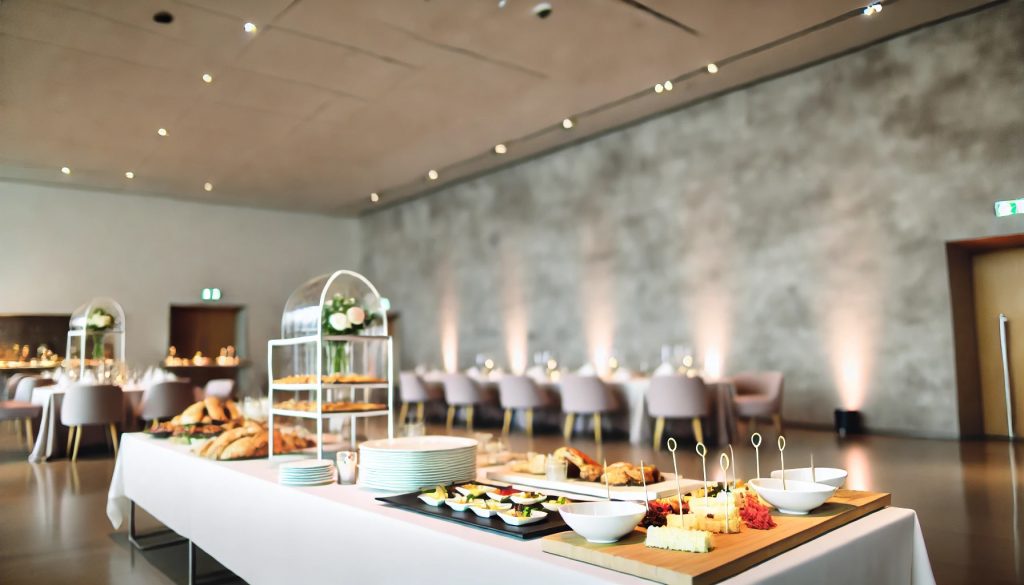A Comprehensive Guide to Catering: Types, Importance, and Key Considerations
Catering is a vital component of the hospitality industry, providing essential food and beverage services across various settings. It goes beyond the traditional notion of serving food in hotels or restaurants; catering encompasses a wide range of operations designed to meet the diverse needs of different clientele, from corporate events to social gatherings, and everything in between. This guide will explore the importance of catering, the different types of catering services available, and the key considerations when planning a catering service.
The Importance of Catering
Catering is fundamental to the success of any event or gathering. It ensures that guests are well-fed and satisfied, contributing to the overall experience and success of the event. The importance of catering lies in its ability to:
-
Enhance Guest Experience: High-quality food and beverage services can elevate the atmosphere of an event, making it more enjoyable and memorable for attendees.
-
Support Event Flow: Properly timed meals and refreshments help maintain the energy and engagement of guests, especially during long events such as conferences or weddings.
-
Provide Professional Service: Catering companies bring expertise in menu planning, food preparation, and service, ensuring that all aspects of the event run smoothly.
-
Offer Variety and Customization: Catering services can be tailored to meet the specific needs of an event, offering a wide range of menu options to cater to different tastes, dietary requirements, and cultural preferences.
-
Manage Logistics: Catering companies handle all the logistical aspects of food service, from sourcing ingredients to setting up serving stations and managing staff, allowing event organizers to focus on other important details.
Types of Catering Services
Catering services can be categorized into several types, each suited to different environments and client needs. Here are some of the most common types of catering services:
-
Corporate Catering: Corporate catering is designed to serve businesses and organizations during meetings, conferences, training sessions, and corporate events. It includes services such as breakfast meetings, luncheons, coffee breaks, and formal dinners. Corporate catering often requires a high level of professionalism and attention to detail, as it reflects the company’s image.
-
Wedding Catering: Wedding catering is one of the most popular types of catering services. It involves providing food and beverage services for wedding receptions and related events like rehearsal dinners and bridal showers. Wedding caterers often offer a variety of menu options, from sit-down dinners to buffets and cocktail receptions, tailored to the couple’s preferences and the theme of the wedding.
-
Social Event Catering: This type of catering is for social events such as birthdays, anniversaries, retirement parties, and family gatherings. Social event catering is typically more informal than corporate or wedding catering, with a focus on creating a fun and relaxed atmosphere. The menu can range from casual finger foods to elaborate multi-course meals, depending on the event’s nature and budget.
-
Concession Catering: Concession catering is commonly found at large public events like sports games, festivals, concerts, and fairs. This type of catering involves setting up food and beverage stands or trucks that serve a wide variety of snacks, fast food, and beverages to large crowds. Concession catering requires efficient service and the ability to handle high volumes of customers quickly.
-
Mobile Catering: Mobile catering refers to food and beverage services provided from a mobile unit, such as a food truck or cart. Mobile caterers typically operate at events, on city streets, or at designated food truck parks. This type of catering is popular for its convenience and the unique, often gourmet, food options it offers.
-
Industrial Catering: Industrial catering provides meals to employees in industrial settings such as factories, construction sites, and remote locations like oil rigs or mining camps. The focus of industrial catering is on providing nutritious, filling meals that sustain workers through long hours and physically demanding work. This type of catering often involves large-scale meal preparation and must meet strict health and safety standards.
-
Institutional Catering: Institutional catering is provided in institutions such as schools, colleges, hospitals, prisons, and military facilities. It involves serving meals to a large, often captive audience, and the food provided must meet specific dietary and nutritional requirements. Institutional catering focuses on consistency, affordability, and the ability to serve large numbers of people efficiently.
-
Specialty Catering: Specialty catering is a more niche service that caters to specific dietary needs, such as vegetarian, vegan, gluten-free, or kosher meals. This type of catering is often requested for events where guests have particular dietary restrictions or preferences, and it requires caterers to have expertise in preparing specialized menus.
Key Considerations for Catering
When planning a catering service, whether for a small gathering or a large event, several key factors need to be considered:
-
Menu Selection: The menu is the centerpiece of any catering service. It should reflect the theme of the event, the preferences of the guests, and any dietary restrictions. Caterers should offer a variety of options to ensure that all guests are satisfied.
-
Budget: Catering costs can vary widely depending on the type of service, the complexity of the menu, and the number of guests. It’s essential to establish a budget early in the planning process and work with the caterer to create a menu and service plan that fits within that budget.
-
Service Style: The style of service (e.g., buffet, plated, family-style, cocktail) should be chosen based on the nature of the event and the preferences of the host. Each service style has its advantages and considerations in terms of cost, staffing, and guest experience.
-
Location and Logistics: The venue’s facilities will impact the catering service. For example, outdoor events may require additional equipment and planning, such as mobile kitchens or tents. It’s important to coordinate with the caterer to ensure that all logistical needs are met.
-
Timing: Timing is crucial in catering. Meals should be served at appropriate times, and the caterer should have a clear schedule for food preparation, setup, and service. This is especially important for events with tight schedules, such as corporate meetings or weddings.
-
Quality and Presentation: The quality of the food and its presentation are critical to the success of the catering service. Food should not only taste good but also be visually appealing. A good caterer will pay attention to the details of presentation, from the layout of the buffet to the garnish on a plated dish.
-
Staffing: The number and expertise of the staff provided by the caterer will affect the level of service. For formal events, more staff may be needed to provide table service, while a buffet or casual event may require fewer servers. It’s important to discuss staffing levels and roles with the caterer in advance.
-
Tastings and Trials: Before finalizing the menu, many caterers offer a tasting session where the client can sample the dishes. This is an opportunity to ensure that the food meets expectations and to make any necessary adjustments to the menu.
Conclusion
Catering is a multifaceted service that plays a vital role in the hospitality industry, providing food and beverage services across a wide range of settings. From corporate events to weddings, and from industrial sites to social gatherings, catering ensures that guests are well-fed and satisfied, contributing to the overall success of the event. Understanding the different types of catering services and the key considerations involved in planning a catered event can help ensure that the service meets the needs of both the host and the guests, creating a memorable and enjoyable experience for everyone involved.


